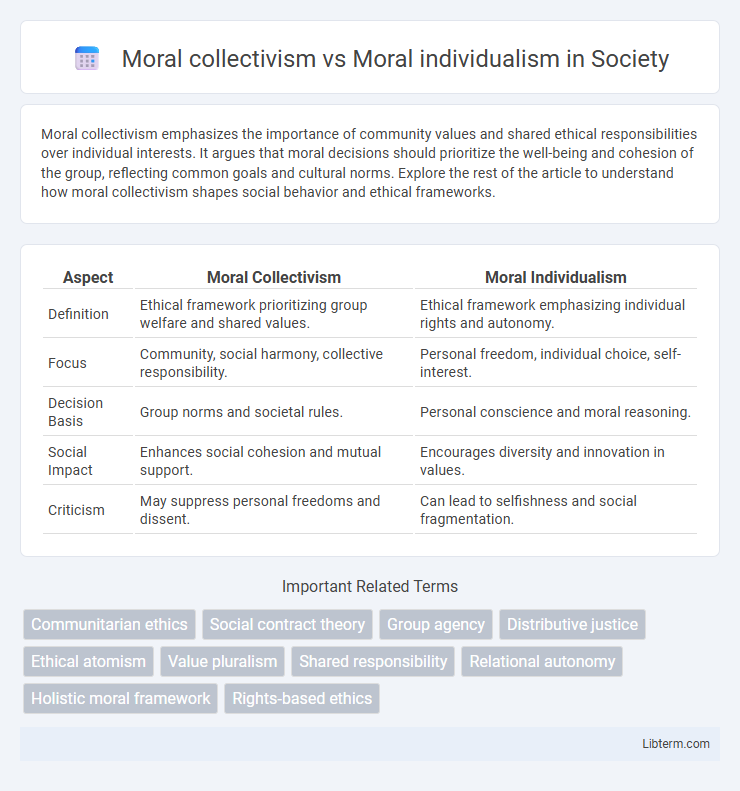Moral collectivism emphasizes the importance of community values and shared ethical responsibilities over individual interests. It argues that moral decisions should prioritize the well-being and cohesion of the group, reflecting common goals and cultural norms. Explore the rest of the article to understand how moral collectivism shapes social behavior and ethical frameworks.
Table of Comparison
| Aspect | Moral Collectivism | Moral Individualism |
|---|---|---|
| Definition | Ethical framework prioritizing group welfare and shared values. | Ethical framework emphasizing individual rights and autonomy. |
| Focus | Community, social harmony, collective responsibility. | Personal freedom, individual choice, self-interest. |
| Decision Basis | Group norms and societal rules. | Personal conscience and moral reasoning. |
| Social Impact | Enhances social cohesion and mutual support. | Encourages diversity and innovation in values. |
| Criticism | May suppress personal freedoms and dissent. | Can lead to selfishness and social fragmentation. |
Understanding Moral Collectivism
Moral collectivism emphasizes the prioritization of group welfare and communal responsibilities over individual rights, asserting that ethical decisions should reflect the collective good. This framework values social cohesion, shared norms, and the interdependence of individuals within a community, often guiding policies that promote unity and common interests. Understanding moral collectivism involves recognizing how moral obligations are embedded within social structures, where individuals derive meaning and ethical purpose from their roles and contributions to the broader group.
Defining Moral Individualism
Moral individualism emphasizes the moral worth and autonomy of each person, asserting that ethical decisions should prioritize individual rights and personal responsibility. It holds that individuals are the primary units of moral concern, with their interests and freedoms taking precedence over collective goals or social groups. This perspective challenges moral collectivism by rejecting the notion that group interests or social cohesion justify overriding individual moral autonomy.
Historical Origins of Both Doctrines
Moral collectivism traces its origins to ancient communal societies and philosophical traditions such as Confucianism and Marxism, emphasizing the primacy of group welfare and social cohesion in ethical decision-making. In contrast, moral individualism emerged from Enlightenment thinkers like John Locke and Immanuel Kant, who championed personal autonomy, individual rights, and rational self-determination as fundamental to morality. The historical development of these doctrines reflects broader social shifts, from collective survival strategies in early civilizations to the modern focus on individual liberty and personal responsibility.
Core Principles: Collectivism vs. Individualism
Moral collectivism emphasizes the core principle that the group's well-being and social harmony take precedence over individual desires, advocating for shared responsibilities and collective moral duties. Moral individualism centers on the autonomy and intrinsic rights of the individual, promoting personal freedom, self-determination, and accountable decision-making. These contrasting ethical frameworks shape perspectives on justice, social obligations, and the role of community versus self in moral evaluation.
Ethical Implications for Society
Moral collectivism emphasizes the ethical importance of group welfare and social cohesion, often prioritizing communal responsibilities over individual rights, which can lead to stronger societal bonds but may risk suppressing personal freedoms. Moral individualism advocates for the primacy of individual rights and autonomy, promoting personal accountability and freedom but potentially resulting in social fragmentation and reduced collective support systems. Balancing these ethical perspectives is crucial for developing policies that protect individual dignity while fostering social solidarity and justice.
Real-World Applications and Examples
Moral collectivism emphasizes group rights and social responsibilities, often guiding policies like universal healthcare systems in Scandinavian countries that prioritize communal well-being over individual gains. Moral individualism focuses on personal autonomy and individual rights, reflected in legal frameworks such as the U.S. Bill of Rights, which protects freedoms like speech and property ownership against collective interference. Real-world applications reveal that collectivist approaches excel in promoting social equity, while individualist principles safeguard innovation and personal liberty.
Notable Philosophers and Thinkers
Moral collectivism is prominently advocated by philosophers like Confucius and Alasdair MacIntyre, who emphasize community values and social roles in ethical frameworks. Moral individualism finds strong representation in the works of John Stuart Mill and Immanuel Kant, who argue for personal autonomy and individual rights as the basis of morality. Both perspectives critically shape contemporary debates in political philosophy, ethics, and social theory, influencing discussions on justice, responsibility, and human rights.
Critiques and Counterarguments
Moral collectivism faces critiques for potentially suppressing individual rights and promoting conformity at the expense of personal autonomy, risking the justification of harmful group-based norms. Critics argue moral individualism better protects individual freedom and ethical responsibility by emphasizing personal moral agency, but it may overlook social context and the importance of community values. Counterarguments from collectivists stress that ethical decisions are inherently tied to social interdependence, challenging individualism's assumption of isolated moral agents and advocating a balance between collective well-being and personal rights.
Balancing Collective and Individual Moral Claims
Balancing collective and individual moral claims involves integrating moral collectivism, which emphasizes the community's well-being and social responsibilities, with moral individualism, prioritizing personal autonomy and individual rights. Effective moral frameworks recognize that promoting social justice and collective goods should not override individual freedoms, while individual moral actions must consider their impact on the broader community. Ethical decision-making benefits from a nuanced approach that respects both communal obligations and personal moral agency, ensuring harmonious coexistence and equitable justice.
Future Trends in Moral Philosophy
Future trends in moral philosophy indicate a growing interest in reconciling moral collectivism and moral individualism through integrated ethical frameworks that emphasize both social responsibility and personal autonomy. Emerging theories focus on the role of community-based values in shaping individual moral development while acknowledging the importance of individual rights and freedoms. Advances in artificial intelligence ethics and global interconnectedness further drive the evolution of moral philosophy toward hybrid models that balance collective welfare with individual moral agency.
Moral collectivism Infographic

 libterm.com
libterm.com